On a calm and sunny Monday morning in May, Samuel Rouse hops into his small skiff to make an easy commute, zipping across Provincetown Harbor toward a 37-foot sailboat that will be his workplace for the day.
He ties up his skiff to the stern of the sailboat and lugs his bag of tools aboard the Dark Star, owned by the photographer John Romualdi. Rouse is a rigger, a job that includes climbing masts and installing electronics — he can do just about anything that needs to be done to keep a small pleasure craft running.
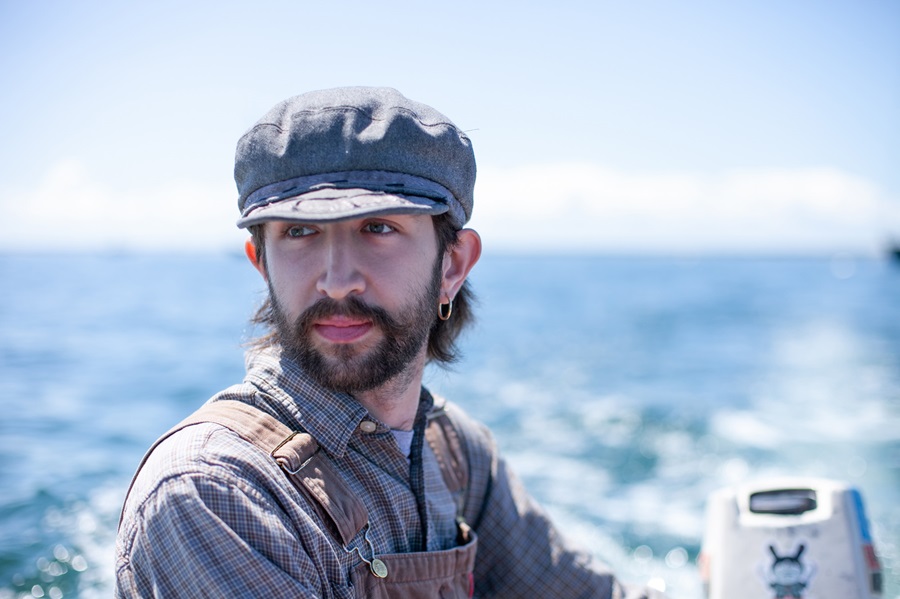
Today, Rouse is going to wire an alternator and work on solar panels. When he’s climbing, he works on standing rigging and running rigging. (“Try to say that three times fast,” he jokes.) Running rigging is the term for the ropes that control the sails, whereas standing rigging refers to the fixed lines, wires, or rods that support the mast.
He was introduced to rigging work on the Draken Harald Hårfagre, a replica of a Viking longship built in the port of Haugesund, in western Norway. The ship took him aboard in Portland, Maine as an unpaid volunteer deckhand.
Rouse, 24, grew up in Weare, N.H., about 70 miles inland from Portsmouth. He was an Eagle Scout and developed an interest in mechanics by working on cars with his father. In his senior year of high school, he and a group of Scouting friends bought a 32-foot sailboat. “I hadn’t been on a boat much before that,” he says. But the constant tinkering needed to keep a boat going suited him: “I was one of those people who would take things apart to see how they worked.”
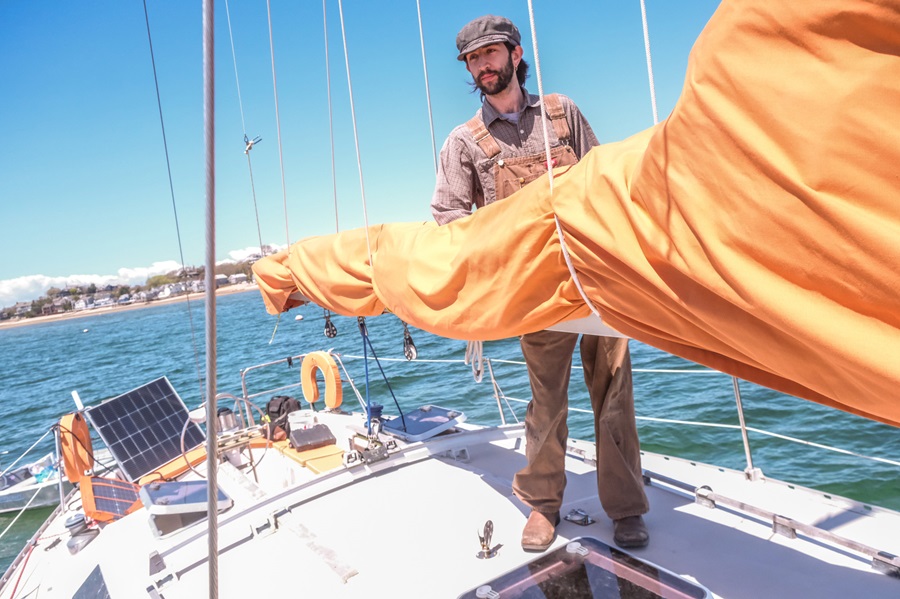
Working on the Draken, Rouse found a mentor in the captain, a Swedish man who had sailed around the world and was both laid back and “knew how to run a tight ship.” After working on the boat for two months, Rouse felt he was ready for his own adventure. He bought a sailboat — the Nortena, a 1962 Pearson Triton 28 — in 2020 and embarked on a journey down the Eastern Seaboard, though, as he told the Town Dock shipping news in Oriental, N.C., his longest stretch at sea until then had been one and a half days.
Fate intervened when a few days into his solo trip he got caught in a storm. Awash in salt water, the boat’s electronics were blown out. He was about 45 miles offshore but made it into the Chesapeake Bay. He waited in an anchorage in Virginia for a few days, replacing all the batteries on the boat and tuning up the electronics.
While he was there, a small sailboat came in, captained by Will Harrington, a fixture among Provincetown’s street musicians. Rouse was invited into Harrington’s convoy, which included another boat on its way to Key West. They all tied up at a free dock. That’s where he met Kiki Jackson, a sailor, bartender, and Provincetown resident.
“We all went to the KFC-Taco Bell together,” says Rouse. “That’s where we had our first date. And the rest is history.”
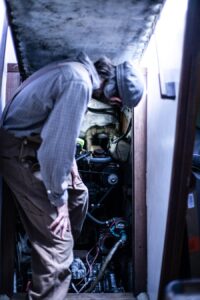
The following summer, Rouse moved to Provincetown to live with Jackson and established Rouse Rigging, his business servicing boats in the harbor. “The first time I visited Provincetown was when I moved here,” he says. He hopes to stay, but he’s nervous about housing. The rental he shares with Jackson is going up for sale in November.
Rouse put up some flyers around town and placed a classified ad, but he has built up a client base mostly by word of mouth. Rigging is a niche job and there aren’t many like him, traveling to clients’ boats to do repairs and upgrades.
After high school, Rouse had planned to study electrical engineering. But that first boating experience with his Scouting friends proved formative, and “a gap year turned into a permanent gap year,” he says.
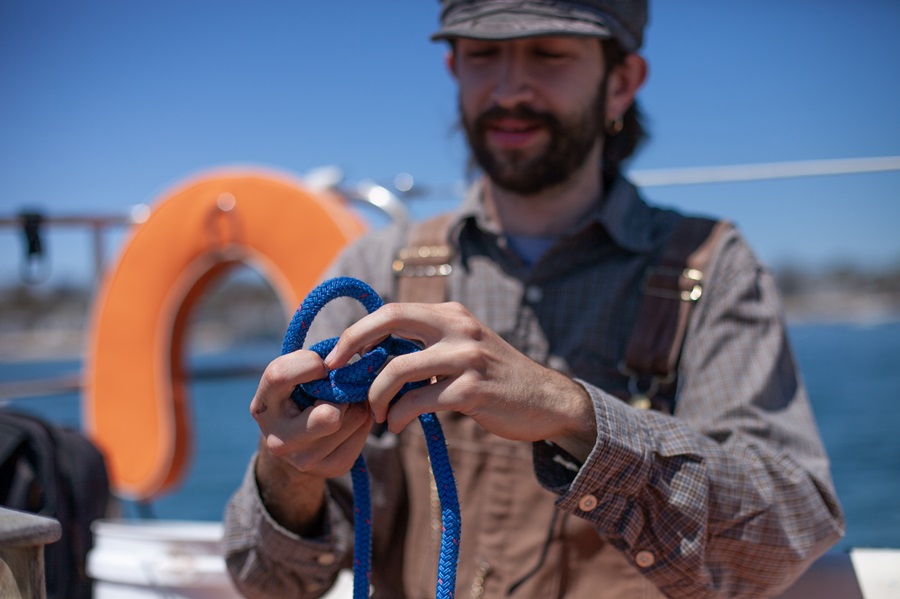
Instead of going to college, Rouse fashioned his own education, learning on the job, following the advice of mentors, and gaining a patchwork of certifications through the American Boat & Yacht Council and the National Marine Electronics Association. He’s also completed Cape Cod Community College’s marine technician training program and a course in marine surveying at the Chapman School of Seamanship in Stuart, Fla.
In addition to parts catalogs, Rouse’s bookshelf includes The Ashley Book of Knots, The Complete Rigger’s Apprentice, Celestial Navigation for the Yachtsman, and a book that suggests the breadth of his self-sufficiency: Where There Is No Doctor.
The work of a marine technician is relatively unregulated, Rouse says. “There are no legal permits,” he says. “The industry is too small,” which he believes is a good thing because it has allowed him access to the profession.
Each boat comes with new challenges and problems, but many of the boats he works on are already familiar. Romualdi is the second owner of the Dark Star that he’s worked for. Earlier in the boat’s life, Rouse had to think on his feet when its engine started smoking three days before it was required to leave the Provincetown Marina for Northside Marina in Dennis, where it spends the winter. The exhaust riser was broken, and exhaust was being pumped straight into the cabin. He got supplies overnighted to Provincetown and cobbled together the riser so that the Dark Star could make the trip to Dennis on time. “I got it going, and it worked.”
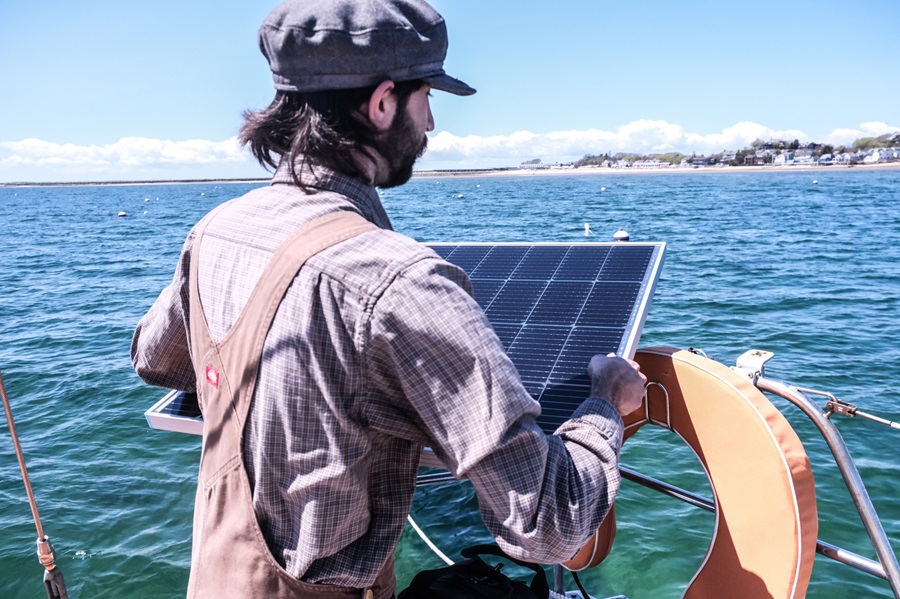
In Provincetown, the challenges of the job range from adjusting the rigging on a mast while being knocked around by the wake of a whale watch boat to navigating the dramatic seasonal swings. In the past, he’s taken his boat south for the winter, but this year he stuck around, setting up his website and waiting for the season and “going to the soup kitchen,” he says.
Now that the season is underway, Rouse’s work puts him at his computer when he’s not aboard vessels. Sourcing parts is a big part of the job. Some of them, like the exhaust riser, need to be ordered online, but he’s also a frequent visitor at Land’s End Marine Supply in town.
The main skills involved in rigging, at least as Rouse describes his work, are curiosity and a willingness to figure out how things work. And that’s exactly what he excels at and loves. He puts it this way: “I can’t see myself doing anything else.”



